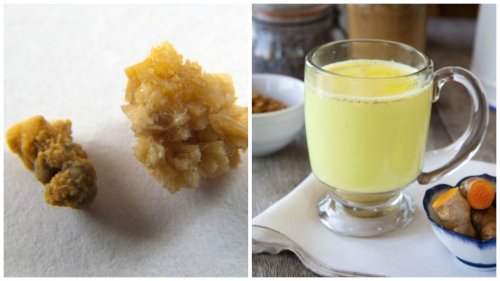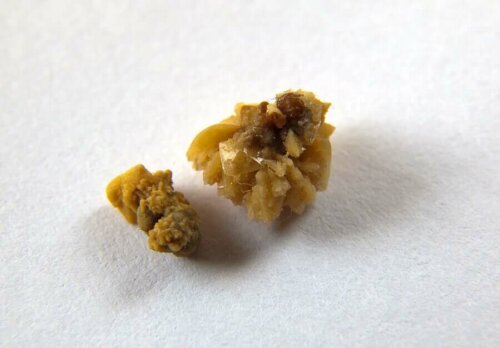Combat Kidney Stones with Ginger and Turmeric Tea

Ginger and turmeric tea is a natural drink that, according to beliefs, could supplement daily hydration, something essential when it comes to dissolving and expelling kidney stones.
You can make it easily at home from the ingredients we already mentioned, which stand out for their anti-inflammatory properties.
Below, we’ll review the importance of maintaining the kidneys healthy and we’ll later tell you more about the drink.
The kidneys
The kidneys are excretory organs that are responsible for filtering the toxins and impurities in the blood to later expel them through the urine. Kidneys stones are one of the conditions that usually develop in this important part of the body.
They’re solid pieces formed by substances present in the urine which can be as small as a grain of sand or as large as a pearl.

Composed of minerals or proteins retained in the kidneys, they cause dangerous obstructions in the urinary tract. This, in turn, causes severe pain, blockages in the urine, and other symptoms that affect your quality of life.
The problem is that doctors don’t always detect them in a timely manner and, as their size increases, complications arise that make their treatment more difficult.
Although surgical intervention is necessary in some cases, some home remedies can help dissolve them. In this article, we want to share a ginger and turmeric tea with you.
Discover: 8 Bad Habits that Lead to Kidney Impairment
Ginger and turmeric tea to combat kidney stones
Ginger is a root rich in various bioactive compounds, such as gingerol, which has analgesic, anti-inflammatory, antiemetic, and digestive properties. Therefore, it can be a valuable food when it comes to relieving various discomforts, including kidney stones.
For its part, turmeric is a spice that contains curcumin, which gives it antioxidant, anti-inflammatory, and analgesic effects.
According to popular beliefs, as it’s anti-inflammatory and provides antioxidants (which contribute to health of the entire body), consuming it on a regular basis in the diet can be beneficial.
The combination of these two ingredients could help hydrate the body, while contributing to relieving discomfort while urinating and expelling the stones.
Discover: Why is Hydration so Important?
Ginger and turmeric tea recipe
Ingredients
- ½ liter of water (500 ml).
- A teaspoon of turmeric powder (5 g).
- 1 piece of ginger root (1 inch or 2.5 cm).
- 1 tablespoon of honey (5 g).
Instructions
- Heat the water in a pot. When it boils, pour it into a pitcher with the ginger root and turmeric powder.
- Let stand for 10 to 15 minutes so that the extracts of the spices can concentrate.
- After this, strain the tea, serve it a cup, and sweeten it with honey.
- Consume it maximum once a day.
Contraindications
- Patients with liver disease shouldn’t consume this drink.
- It also isn’t recommended in pregnancy or while breastfeeding.
- Patients with chronic heart disease should refrain from consuming the drink, as it could cause interactions.
Ginger and turmeric tea: a drink to stimulate urination
In any case, it’s best to always consult your doctor before consuming this drink or any other home remedy, as it could be counterproductive.
If your doctor authorizes the consumption of a drink or home remedy, take it as directed and always as a complement to a healthy lifestyle. Never as a substitute for medications or main meals.
There’s no scientific evidence that ginger and turmeric tea is a 100% effective remedy for treating kidney stones. Therefore, its benefits come from anecdotal data.
You shouldn’t take it as if it were a cure or treatment for any disease, but as a possible complement to a healthy lifestyle, if your doctor authorizes it.
All cited sources were thoroughly reviewed by our team to ensure their quality, reliability, currency, and validity. The bibliography of this article was considered reliable and of academic or scientific accuracy.
- Greger, M. (2015). Who Should be Careful About Curcumin? Nutritionfacts.org. https://nutritionfacts.org/es/blog/who-should-be-careful-about-curcumin/
- Seddik, Ayman. (2016). The Effect of Turmeric and Ginger on Oxidative Modulation in end stage renal disease (ESRD) Patients. https://www.researchgate.net/publication/306015084_The_Effect_of_Turmeric_and_Ginger_on_Oxidative_Modulation_in_end_stage_renal_disease_ESRD_Patients
- Tang, M., Larson-Meyer, D. E., & Liebman, M. (2008). Effect of cinnamon and turmeric on urinary oxalate excretion, plasma lipids, and plasma glucose in healthy subjects. The American journal of clinical nutrition, 87(5), 1262–1267. https://pubmed.ncbi.nlm.nih.gov/18469248/
- Veisi, P., Zarezade, M., Rostamkhani, H., & Ghoreishi, Z. (2022). Renoprotective effects of the ginger (Zingiber officinale) on Diabetic kidney disease, current knowledge and future direction: a systematic review of animal studies. BMC Complementary Medicine and Therapies, 22(1). https://bmccomplementmedtherapies.biomedcentral.com/articles/10.1186/s12906-022-03768-x
- Zhou, X., Afzal, S., Wohlmuth, H., Münch, G., Leach, D., Low, M., & Li, C. G. (2022). Synergistic Anti-Inflammatory Activity of Ginger and Turmeric Extracts in Inhibiting Lipopolysaccharide and Interferon-γ-Induced Proinflammatory Mediators. Molecules (Basel, Switzerland), 27(12), 3877. https://www.ncbi.nlm.nih.gov/pmc/articles/PMC9229778/
This text is provided for informational purposes only and does not replace consultation with a professional. If in doubt, consult your specialist.








